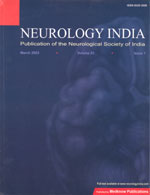
|
Neurology India
Medknow Publications on behalf of the Neurological Society of India
ISSN: 0028-3886 EISSN: 1998-4022
Vol. 53, Num. 1, 2005, pp. 59-59
|
Neurology India, Vol. 53, No. 1, January-March, 2005, pp. 59
Invited Comments
Invited Comments
Nagga Katarina
Department of Geriatric Medicine, University Hospital, SE-581 85 Linkoping
Correspondence Address:Department of Geriatric Medicine, University Hospital,
SE-581 85 Linkoping
Email: katarina.nagga@lio.se
Related article: Clinical and laboratory features and
response to treatment in patients presenting with vitamin B12 deficiency-related
neurological syndromes
Code Number: ni05015
It is today well known that vitamin B12 deficiency can be associated with neuropsychiatric symptoms. Several studies have previously demonstrated that vitamin B12 deficiency is more common in patients with dementia symptoms than in the cognitively non-impaired. This topic is touched upon in the article "Clinical and laboratory features and response to treatment in patients presenting with vitamin B12 deficiency-related neurological syndromes" in the current issue of Neurology India. Vitamin B12 deficiency increases with age and is present in 5-40% of the elderly population. However, the mechanism of neurological damage induced by a quantitative or functional vitamin B12 deficiency is still unclear.
Vitamin B12 exerts its physiological effect on two major enzymatic pathways: the conversion of homocysteine to methionine and the conversion of methylmalonyl coenzyme A to succinyl coenzyme A. Disruption of either of these pathways due to vitamin B12 deficiency results in an elevation of both serum homocysteine and methylmalonic acid. Homocysteine levels are also elevated in the case of folate deficiency. Serum homocysteine is proposed to be more sensitive for functional intracellular vitamin B12 deficiency than analysis of vitamin B12 in serum.[1] Hence, homocysteine, vitamin B12, and folate are closely linked together in the so-called one-carbon cycle. The proposed mechanism relates to the methylation reactions involving homocysteine metabolism in the nervous system.[2] Smith[3] has suggested that the brain suffers from a double whammy from hyperhomocysteinaemia: cerebrovascular damage that triggers or potentiates the effect of Alzheimer pathology combined with a direct neurotoxic effect of homocysteine.
There is an ongoing debate about the contribution of vitamin B12 deficiency to the dementia syndrome. The current article adds to those finding an effect on cognitive function as a result of vitamin B12 treatment in patients with cognitive impairment and co-occurring vitamin B12 deficiency. One of the most intriguing findings in the study is the low mean age of the investigated subjects. It must be considered unexpected to find such a high percentage of cases with cognitive symptoms in ages below 65 years. It would be very interesting to see added neuropsychological data on the dementia cases, to elucidate exactly in what cognitive domains there was an improvement. It is possible that such a study might contribute to a better understanding of role of vitamin B12 deficiency in dementia evolution.
References
| 1. | Joosten E, Van den Berg A, Riezler R, Naurath HJ, Lindenbaum J, Stabler SP, et al. Metabolic evidence that deficiencies of vitamin B12 (cobalamin), folate, and vitamin B6 occur commonly in elderly people. Am J Clin Nutr 1993;58:468-76. Back to cited text no. 1 |
| 2. | Santosh-Kumar C, Hassell K, Deutsch J, Kolhouse J. Are neuropsychiatric manifestations of folate, cobalamin, and pyridoxine deficiency mediated through imbalances in excitatory sulfur amino acids? Med Hypotheses 1994;43:239-44. Back to cited text no. 2 |
| 3. | Smith AD. Homocysteine, B vitamins, and cognitive deficit in the elderly. Am J Clin Nutr 2002;75:785-6. Back to cited text no. 3 [PUBMED] [FULLTEXT] |
Copyright 2005 - Neurology India
|
